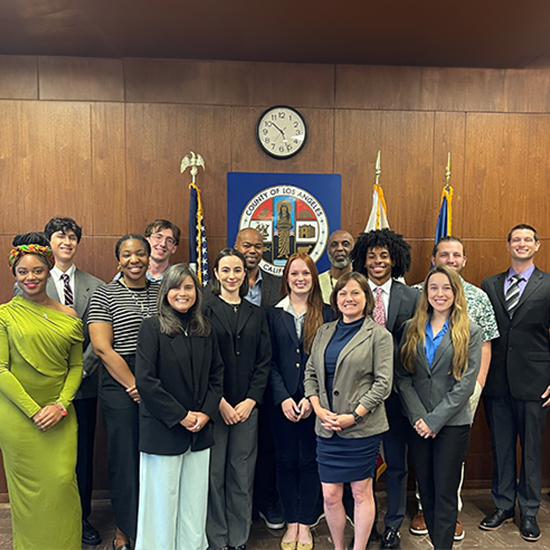Student Policy Teams Present Strategic Plans for LA Jail Closure

This Spring semester, students from Pepperdine University’s School of Public Policy had the unique opportunity to present proposals to the LA County Chief Executive Office for managing the closure of a Los Angeles County Jail.
The presentations were part of a graduate-level seminar in dispute resolution and public policy led by Dr. Shaphan Roberts, senior director for strategic initiatives and global expansion, and adjunct professor at the Caruso School of Law. The seminar is designed to introduce students to system thinking, organizational change, and foundational mediation and facilitation skills to resolve public policy challenges.
The final project for the course requested students to incorporate classroom concepts to propose strategies for navigating the legal, economic, and social implications of the LA County jail closure. The proposals were aimed at assisting the LA County’s Community Safety Implementation Team (CSIT) in its goal to close the Men’s Central Jail and strengthen alternatives to incarceration by expanding community-based care. Students presented their proposals to CSIT leadership including executive director, Wilfred Pinkney, and deputy executive director, Chidinma Ume. Students were divided into teams of two and delivered a 25-minute pitch followed by 10-minutes of responding to questions.
The proposals allowed the students to apply negotiation and mediation strategies to address conflicting stakeholder priorities. The policy matter meets various challenges, including how to manage the transition of incarcerated individuals and jail staff, plans to reallocate resources to support alternative programs, and strategies for building trust with the community members and law enforcement. Each proposal was informed by in-depth research into the LA County community and criminal justice systems.
“My colleagues and I had the incredible opportunity to create proposals and conduct research addressing the ongoing efforts to close Men's Central Jail. I am so grateful for Ms. Chidinma Ume and Dr. Wilford Pinkney's time as well as their guidance regarding our presentations and future professional development,” said first-year SPP student McCall Zeutzius. “From Ms. Ume and Dr. Pinkney's valuable feedback, I learned how to better prepare presentations for county officials, such as improving methods to condense and organize information. Conducting research and presenting on an urgent matter within Los Angeles was deeply engaging, especially because of the project's exposure to real-world and cross-sectoral public policy issues.”
Reflecting on the experience, Dr. Roberts noted, “Watching students engage with the Jail Closure Team through a systems lens was profoundly affirming. They moved beyond linear problem-solving and embraced the complexity of incarceration, accountability, and healing. By interrogating structures, assumptions, and unintended consequences, they embodied the very essence of civic fusion, bridging divides to generate insights that no single stakeholder could have reached alone. Their work demonstrated how deep learning can do more than impart knowledge; it equips students to actively reshape policy discourse, bringing fresh perspectives and collaborative energy to complex, real-world challenges.”